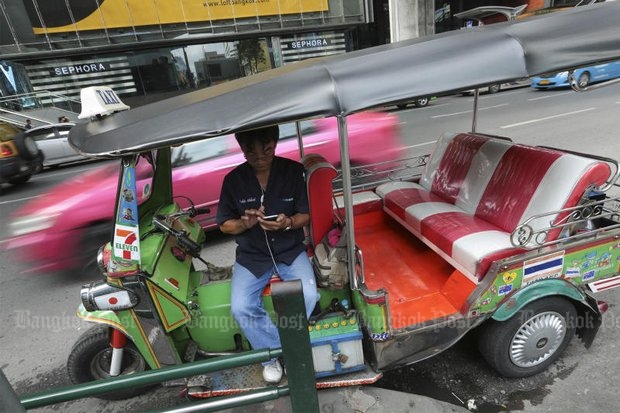
Love at first sight was how a group of Dutch people referred to their affection for tuk tuks when they spotted the vehicles while in Thailand in the early 2000s.
You won't doubt their affection for the cute vehicles if you read their story, which they have shared on their corporate website.
The group loved the vehicle so much that they imported a batch of 50 tuk tuks to the Netherlands in 2006, which they claimed quickly became a huge hit.
But they realised the cute-looking vehicle was a pollution menace, noisy, expensive and not very well-built. So they began asking themselves why they didn't just create their own version that would be clean, premium and require less maintenance.

Sirinya Wattanasukchai is an assistant news editor, the Bangkok Post.
It took them only two years to set up their "Tuk Tuk Factory" in 2008 and build their unique e-Tuks for export around the world. Although the e-Tuks are not designed for personal use, they serve many functions including for cargo, pick-up, or vending vehicles.
As we already know, tuk tuks have been widely used in many countries for decades, including India, and Indonesia, some with different names. They are popular around the world for their compact size and practicality.
Thailand takes pride in the vehicle as a national symbol, though it was in fact an adaptation of Japan's motorised rickshaws that hit Thai streets some 60 years ago.
Remember how Miss Thailand Universe won the top costume award at a pageant in Las Vegas with her tuk tuk costume back in 2015?
Despite Thai people's tremendous pride about the tuk tuk, the vehicle is poorly treated. We have maintained its originality -- though not in good ways. The loud engine remains ear-piercing, and its exhaust fumes are irritating and a health hazard. But to make it more Thai, we have also managed to add an acrobatic driving performance, making it a must-do for adventurous visitors.
With its cute look, our tuk tuk has become the perfect prop at some marketing events or as a vending cart for ice-cream or coffee. As a vehicle, it's also used as a mini-truck by vendors who transport goods from markets.
Currently, about 20,000 tuk tuks are registered as taxis in the country. Of the total, 9,000 of them are in Bangkok. Those serving as shuttles for expensive condos and housing estates are not registered for road use and thus limited to private compounds, not public streets.
It is also clear the government doesn't support the growth and development of this vehicle. The Department of Land Transport approved only some 800 permits for new tuk tuks in 2015.
Even people in the tuk tuk industry are upset about a lack of support from the state for this iconic vehicle. A salesperson said there is a real suspicion and fear that the tuk tuk may turn into a rival for imported Japanese cars if it becomes more practical, safe and affordable.
I don't know if the accusation is true. But I can't see any reason why the government cannot support further research and development to improve the petrol-driven vehicle as an electric tuk tuk, as well as ease restrictions so that the tuk tuk can be used by all households.
The development of the tuk tuk would benefit not only lower-income families, especially those in the provinces, but also delivery people, so they can have safer transport. Did you ever fear that a stack of rolled fabric would collapse on you when you were stuck next to it at a red light? With a safer and cheaper tuk tuk, the excuse of using -- or misusing -- motorcycles to deliver large items would no longer be valid.
According to a salesperson at a local manufacturer, a tuk tuk that travels at a maximum speed of 50 kilometres per hour, with a carrying capacity of three people including the driver, costs about 300,000 baht. The battery, which costs about 30,000 to 50,000 baht depending on the vehicle's capacity, needs to be changed every few years, depending on its use. The maintenance fees are comparatively low versus more complicated car engines.
If you wonder about the safety of tuk tuks, they are supposed to be much safer than motorcycles. For those who are afraid the vehicle might suddenly tip over on a sharp curve, the salesperson said it depends on how you drive it. Just as with any vehicle, you are meant to slow down when making turns.
The salesperson has a point: It's not just a question of the vehicle itself, but the quality of the drivers on the roads.
And should the government choose to be more supportive, Thais may soon have their iconic and pollution-free tuk tuks on the streets -- after the Dutch.
